March 31, 2009
The Investigative Reporter’s Handbook: Investigating Education
By Ashley Dischinger
Examining issues with educational systems can be a tedious and frustrating process, but it is one that can provide the public with deeply meaningful stories. Chapter 12 of The Investigative Reporter’s Handbook deals with various issues surrounding the investigation of educational institutions.
Secondary and higher institutions of education must be carefully scrutinized through both traditional reporting and the use of databases and social science methods.

Exposing corruption in Alabama’s two-year college system
Reporter Brett Blackledge of The Birmingham News won the 2007 Pulitzer Prize for Investigative Reporting. In a 10-part series Blackledge scrutinized Alabama’s two-year college system. He exposed many instances of corruption within the system, resulting in the dismissal of the chancellor.
Blackledge’s reporting reflects the advice given in Chapter 12 for investigating institutions of higher learning. In his investigation he “followed the money” and scrutinized the faculty within the system.
Following the money and scrutinizing faculty
His thorough investigation into these areas revealed, among other instances of corruption, that a former college chief set up tens of thousands of dollars in contracts and scholarships for his children and those of administrators in Alabama’s two-year college system.
Studying public documents to pinpoint budget misuse
By studying public documents such as various colleges’ budgets, Blackledge determined that there were many instances of budget misuse and irresponsible spending. One school spent millions in state funds on friends and relatives of the college chief. Some relatives and children were even reserved scholarship funding and jobs within the system, including one woman who is now the state’s longest-serving board member.
Blackledge used public payroll records to find relatives working within the school system, and noted their specific incomes. Often, their contracts with the school also included various benefits that other faculty members and administration did not receive.
An exceptional performance of watchdog journalism
Blackledge’s investigation explored many of the questions posed in Chapter 12. He looked into how the faculty of the school system are recruited and hired and how staff and administrators evaluate them. Most importantly, how their salaries and benefits compare with those of other schools.
Thanks to Blackledge’s exceptional performance of watchdog journalism, the illegal and immoral activities within Alabama’s two-year college system were rightly exposed. The administration was finally brought to justice after many years.
After navigating through many statistics, reports, public documents and personal interviews, Blackledge produced a rewarding and informative series that brought to light an important issue to the public.
March 18, 2009
Inside the Intricate Mind of an Internet Developer: A Look into the Life of John David Parsons
By Ashley Dischinger

John David Parsons remains hard at work, juggling computer science classes and his job as Elon's Web applications developer.
John David Parsons not only manages to juggle classes and a full-time job as Elon University’s Web applications developer, but he pulls it off in a way that earns the respect of everyone with whom he interacts.
Parsons has worked as a member of the Elon University relations team since receiving his B.A. in international studies in 2006.
“I love my job,” Parsons said. “I want to stick with it even after I finish classes (this spring). It’s a great atmosphere. It’s very relaxed and with the economic downturn, there’s no better place to be employed than a university.”
Self-guided and spontaneous
Parsons describes his job as self-guided. He spends his time brainstorming and implementing new Web features, fixing computer bugs as they surface and often being pulled away from his office to solve various computer-related problems.
Parsons never knows quite what to expect when he arrives at work every morning, but he wouldn’t have it any other way. His personality is compatible with the spontaneity of his job description, according to Dan Anderson, director of University Relations.
‘Not your typical computer programmer’
“(John David) is very creative and committed to making applications the best they can be,” Anderson said. “He has a number of talents, and all of that shows up in his work. He’s not your typical computer programmer.”
 Olivia Hubert-Allen, Elon senior and former editor of The Pendulum, shares Anderson’s esteem for Parsons’ work ethic.
Olivia Hubert-Allen, Elon senior and former editor of The Pendulum, shares Anderson’s esteem for Parsons’ work ethic.
“He’s always been very curious and enthusiastic about computer programming,” Hubert-Allen said.
Working tirelessly on The Pendulum Web site
Hubert-Allen saw Parsons’ dedication first -hand after collaborating twice on The Pendulum Web site, in 2005 and 2007.
The first revision altered the site so that everything was database-driven and could be easily searched and archived. After “getting a foot in the door” with the first revision, Parsons helped Hubert-Allen again in February 2009.
This time The Pendulum site was completely revamped to include even more features and a more aesthetic layout. Parsons helped optimize the site for search engines, making it easier to comb for information.
The new site, which contains every story in the print edition, also has a mobile phone version, which is very rare for student media sites and even professional local news sites.
“John David worked endlessly on The Pendulum Web site — it was unreal,” Hubert-Allen said. “(He) stayed up for close to 40 hours during the final tweaks on the site. I gave him a few days off after that.”
Taking E2 and running with it
Parsons also demonstrated his tireless work ethic with the debut of E2, Elon’s own social network, which was his first project as the Web applications developer.
“When I decided to build E2, I gave (Parsons) a few ideas, and he really ran with it,” Anderson said.
Parsons said E2 is similar to other social networking sites such as Facebook, but believes the difference lies in the many features that are unique to the Elon community.
“E2 is an internal social network,” Parsons said. “The real benefit is that it gives the alumni a window into communicating with (a younger) age group. It’s their way of entry into the social networking phenomena.”
Click below to listen to the ‘best life advice’ Parsons received:
Parsons still updates E2 regularly and constantly envisions new ways to improve the system. With the next round of revisions looming, Parsons hopes to add more Elon-specific features.
“I would like to see features that really connect current students with alumni in their respective fields,” Parsons said. “I want this next revision to lead to real-life handshakes and human-to-human interaction.”
First a computer programmer, but also an artist
Anderson and Hubert-Allen also praise Parsons’ multi-faceted personality and his varied talents.
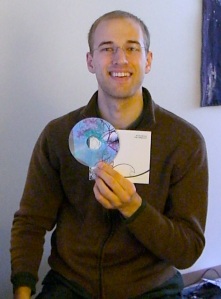
Parsons displays Anonymous' latest CD, which he helped record, produce and now promotes. Parsons enjoys exercising his musical talents in his spare time.
“He’s a programmer, first and foremost,” Hubert-Allen said. “But he is also an artist.”
Parsons is very musically inclined since he grew playing the guitar and piano. He soon discovered Reason, a computer program that features a virtual music-making studio.
“It was a powerful tool that first connected my music side and my computer side,” Parsons recalled. “It’s really fun to play around with.”
He started recording music for local up-and-coming bands, such as Anonymous, and he uses his friend’s studio to record, produce and mix the music before making CDs for distribution.
Parsons still finds the time to compose music with his own band, Head Chemists, which he describes as a hybrid of “acoustic electronic” music. The Head Chemists play as a hobby, but their music can be purchased on iTunes.
Lacking a Nintendo but filing up his passport
Parsons also shares a passion for traveling. While he was an undergrad at Elon, he studied abroad four times, including a summer in Mexico and a semester in Costa Rica. His family, who always saved money to travel, has visited places like Cambodia, Singapore and Japan.
“I like the newness of everything (when traveling),” Parsons said. “It’s nice to break out. It’s like a breath of fresh air to be washed over by another culture.”
Parsons paused and smiled.
“Actually, it’s like restarting your computer,” he said.
Elon University Joins N.C. Open Government Coalition in Celebrating Sunshine Week
By Ashley Dischinger

March 15 marked the beginning of Sunshine Week, a non-partisan cause that celebrates the right to open government. The week-long initiative focuses on educating the public about their rights. Image taken from iStockphoto.
March 15 marked the beginning of the national week-long initiative hosted by the American Society of Newspaper Editors to promote the importance of open government and freedom of information.
Opening the dialogue between the government and its people
The national initiative, known as Sunshine Week, empowers citizens to take an active role in increasing the dialogue between the government and its people.
Sunshine Week is a non-partisan cause that educates the public on the need for an open, accessible government in order to strengthen communities. Common participants in the effort include print, broadcast and online media, civic groups, libraries, non-profits, schools and anyone else interested in the public’s right to know.
Elon celebrates the sun shining on democracy
“It’s all about celebrating the right to open government and that the sun can shine on democracy,” said Dr. Connie Book, associate dean of the School of Communications and

Elon University plays an important role as the N.C. Sunshine Center. Elon's role is symbolic of the union between government and education. Photo taken from iStockphoto.
executive director of the Sunshine Center of North Carolina.
Elon University plays a large role in the initiative and has acted as the home of the Sunshine Center since 2006. After realizing most states already had an open government coalition, the university proposed the formation of its own center to the Open Government Coalition.
“Most coalitions like to have an academic relationship to their organization, since the idea is to educate,” Book said.
‘How to’ theme that brings light to important issues
This year the Open Government Coalition is hosting Sunshine Day on March 18 at the Levine Museum of the New South, located in Charlotte, N.C. The event will feature an ensemble of speakers, including publishers and editors, who will share their experiences with open government laws.
Sunshine Day will also include various workshops aiming to teach public officials, reporters and North Carolina citizens about their right to access and advocate the principles of open government.
According to Book, the event has a “how to” theme and the purpose is not to lobby but to remain strictly educational.
Working toward government transparency
Book said she believes Sunshine Week brings light to an important issue the general community should give its attention to.
“We are currently in a state of emergency in our democracy,” Book said. “The media is really in a shattered shape and the media is supposed to be (the country’s) watchdog … The world in economic turmoil is a good example of what happens without a robust press and watchdog oversight on our government. I’m concerned that until we can figure out a new economic model for the media, we can’t continue to exist.”

The open government policies that Sunshine Week promotes are essential to maintaining government transparency, or democracy will be compromised. Photo taken from iStockphoto.
Book and other committee members work throughout the year to help promote awareness that will lead to government transparency. In the past year, Elon’s Sunshine Center has responded to 87 e-mails and 112 phone calls asking for assistance with open government laws. Book has also worked hard to organize the logistics of Sunshine Day.
“Before I (became involved with Sunshine Week), it never came into my consciousness how important open government is,” Book said. “But after having worked for two years watching how the balance of democracy can be tipped and how delicate the people’s position is … we need the media and transparency, or democracy inevitably will fail.”
March 16, 2009
The Investigative Reporter’s Handbook: Investigating the Judicial System and Law Enforcement
By Ashley Dischinger
One of the important issues discussed in Chapters 10 and 11 of The Investigative Reporter’s Handbook is investigating corruption within law enforcement agencies. It is the duty of a journalist to monitor and report on the actions of the police in order to carry out the watchdog function of the media.
Exposing disability pension abuses by police officers
In 1995, two reporters from Newsday in Long Island won the Pulitzer Prize in Investigative Reporting for their series exposing disability pension abuses by police officers in the Long Island area.
Brian Donovan and Stephanie Saul’s 14-part series initially began when the reporters noticed a boom in disability pension claims that were filed by policemen within the past decade. After many months of thorough reporting they found dozens of cases of police officers unjustly collecting pension payments, and essentially robbing taxpayers of millions of dollars a year.
As described in Chapter 11 of The Investigative Reporter’s Handbook, raises, promotions and pensions are all aspects of local law enforcement agencies that can easily “be riddled with personal favoritism, political intrigue, inefficiency and corruption.”
Law enforcement agencies ‘riddled with corruption’
Newsday questioned the possible link between pension payments and loopholes in the police disability system. Their investigation held these police officers accountable for their misdeeds that plagued the Long Island law enforcement system with corruption and inefficiency.
Donovan and Saul’s reporting highlighted a severe flaw in the system and the shocking number of officers who were taking advantage of loopholes. During the initial stages of their investigation they followed both people trails and “the money” to determine motives behind officers abusing pension.
Taking advantage of public resources
The reporters used various resources including public records of disability pension claims in the Long Island area. They also studied documents detailing the police disability system.
The use of these public documents allowed the Newsday team to obtain data specific to their case, including the exact amount of annual disability pension received by many young officers. One 30-year-old officer received $60,471 a year, tax-free according to their research.
Following people trails
Donovan and Saul followed people trails throughout the investigation by using connections to find more sources. Various case studies of sources revealed that many officers file for pension if they are facing criminal charges because if the officer retires early on disability, all criminal charges are dropped. One officer filed for disability pension payments and continued drug dealing.
The Newsday team also found that Long Island has strong police unions that have close ties to many law firms. This makes expert legal representation available for free, whether they are officers convicted of crimes or those injured by criminals.
Newsweek ‘watchdogs’
The work of Donovan and Saul exemplifies how investigative reporting can hold law enforcement agencies accountable for corruption. As The Investigative Reporter’s Handbook says, local police “are entrusted with great power and are a part of daily life.” It is therefore necessary for journalists to continue scrutinizing the actions and behavior of police officers, and in the case of this investigation, to scrutinize the disability pension system.
March 14, 2009
Mac Demere Speaks About Experiences as Freelance Journalist and Automotive Test Driver
By Ashley Dischinger

Mac Demere gives students advice about reporting, ethics and asks their opinions on the future of journalism.
Mac Demere, a longtime freelance journalist and racecar enthusiast, spoke to Elon University students today about his experiences in both fields. He also gave students tips for maintaining a successful career as a journalist and generated discussion on the future of communications.
‘The media is in a war’
Demere expressed his regrets for not taking a variety of communications classes, especially “television classes” while working toward his B.A. in Journalism from the University of Mississippi.
“Regardless of whether you’re going to be in PR or be a print journalist, “ Demere said, “I encourage you to do everything, because right now… the media is in a war. We don’t really know how it’s going to come out.”
Demere believes the uncertainty that lies ahead is comparable to the collapse of the Soviet Union. Even after consulting “smart people” he is unsure of the direction in which media will be heading in upcoming years.
Developing expertise within a field
One thing that Demere is certain of is the necessity of becoming an expert within a specific field.
“You must know enough,” Demere explained, “that when the people are talking to you, you can hear what they’re not saying, you can spot fudges and you can spot outright lies.”
Demere became as close to a self-professed expert in the automotive field as he believes he could be without having worked in the industry. He gained his knowledge through years of working as a freelance automotive writer and Senior Road Test Editor for Motor Trend. He also doubles as a Michelin North America test driver and driving instructor in South Carolina, where he currently resides.
‘Sometimes not being wrong is all you can hope for’
Demere emphasized the importance of accuracy in maintaining credibility. He insists journalists must gather their expertise as quickly as possible in order to ensure preciseness within reporting.
“An analogy I use is you can blow up an engine…by putting in the wrong, little tiny… part,” Demere said, “ just as well as you can by putting in the wrong connecting part. Every little tiny component has to be accurate.”
Demere admits this does not mean that his reporting is perfect, but he does pay close attention to detail.
“Sometimes not being wrong is all you can hope for,” Demere said.
Don’t bore the readers
Demere spoke about the importance of meeting deadlines, writing stories that are the correct length for their respective medium, whether it be print or online, and writing stories that are “interesting and emotion-provoking.”
Demere believes newspapers could be doing much better if they had compelling writers, regardless of the topic. He says journalists must strive for a balance between provocative writing and writing that angers readers.
“You can make (your readers) laugh, you can make them cry… but don’t bore them,” Demere said.
Click below to watch Demere describe some issues involving the ethics of reporting:
A dinosaur trying to survive a changing environment
Demere concluded his lecture by asking students their opinions on what will happen during the next few years in journalism.
Students shared their views on the evolution of communications. Many believe the future will include a combination of the written word and video. Students predict there will still be an audience for print journalism, but new forms will continue to emerge over the years.
“I don’t know the answers, “Demere admitted. “I’m a dinosaur and the world is changing and I want to learn how to survive.”
March 9, 2009
The Investigative Reporter’s Handbook: Investigating the Executive and Legislative Branches
By Ashley Dischinger
Some of the most telling investigative reporting pieces involve closer examinations of the works of government officials. An important part of a journalist’s duty is to act as a watchdog, constantly investigating the actions of the executive and legislative branches to expose any instances of corruption.
Probing corruption in the legislative branch
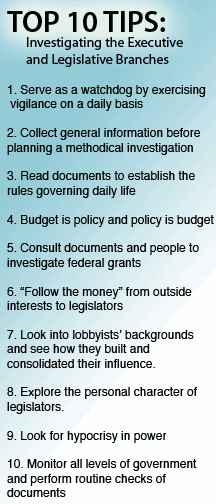
Chapters Eight and Nine in The Investigative Reporter’s Handbook detail how journalists should successfully probe an investigative piece involving the government. Though often a tricky and tedious process, these investigations should be covered thoroughly in order to hold public officials to a higher standard.
The opening of Chapter Nine mentions a scandal investigated by several members of The Washington Post staff. Their series of 10 stories brought to light the misconduct of lobbyist Jack Abramoff, spurred reform efforts and led to the eventual indictment of several other public officials. The staff, including Susan Schmidt, James V. Grimaldi and R. Jeffrey Smith, was awarded the Pulitzer Prize in 2006 for Investigative Reporting.
The Washington Post’s coverage of the Abramoff scandal reflects many of the tips in The Investigative Reporter’s Handbook. Ultimately, the Pulitzer Prize-winning staff continued to scrutinize the conduct of an influential figure and his influence on public policy and legislation.
Following the money
The investigation began when the staff “followed the money” after realizing an Indian tribe and gambling services company made donations to a Washington public policy group. The staff researched the contributions from outside interest groups (the Indian tribe and a gambling services company) to legislators (Abramoff and his Republican associates.)
By studying numerous reports documenting expenses and donations, the Washington Post staff concluded that Abramoff had encouraged American Indian tribes and other clients to make close to $2.9 million in federal political contributions.

E-Lottery, a gambling services company, was just one of the outside interest groups linked to the Abramoff lobbyist scandal. Logo from the e-Lottery Web site.
After doing some initial research, they discovered that Abramoff had arranged a questionable weeklong trip that was funded by the Choctaw Indian tribe and eLottery, a gambling services company, both of which deny knowing their money would be funding the trip.
Investigating motives behind the ‘raw dollars’
The Washington Post staff went beyond looking at the “raw dollars” and investigated the motives behind the large donations on behalf of these groups, an important next step emphasized by the Investigative Reporter’s Handbook.
Shortly after this investigation, the Republican officials with whom Abramoff was closely associated killed the Internet Gambling Prohibition Act, which was opposed by eLottery and the Choctaws. It quickly become clear that Abramoff was encouraging financial contributions in exchange for influencing legislation that would favor the contributing groups.
As the investigation continued, the reporters also revealed that Abramoff funded various trips and other “favors” to congressmen to further ensure favorable legislation for his clients.
Close scrutiny leads to justice
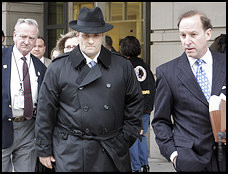
Abramoff leaves the Federal Court in the wake of his lobbying scandal. The photo is taken from the Flickr Commons.
The Washington Post staff followed many of the steps for investigating lobbyists, as specified by the Investigative Reporter’s Handbook.
They closely examined the groups, businesses and government officials with which Abramoff was closely associated, which led them to the corrupt practices of several prominent Republican officials and congressmen.
Their award-winning work serves as a prime example of how investigative reporting can “push legislators to make decisions contrary to the public’s interest,” as discussed in Chapter Nine of the Investigative Reporter’s Handbook.
March 4, 2009
Elon University Periclean Scholars Host ‘Eat at Dan Thai’ Fundraiser
By Ashley Dischinger
Elon University’s Periclean Scholars hosted “Eat at Dan Thai” to raise funds benefitting the incoming 2012 Project Pericles class.

Students and faculty were encouraged to eat dinner at Dan Thai restaurant in Burlington, N.C. beginning at 5 p.m. The program hopes to raise between $150 and $200 for the incoming freshman class, which will be selected after spring break.
Junior Sara Pasquinelli, a member of the 2010 Periclean class, was enthusiastic about Eat at Dan Thai and hopes that many Elon students will come out to show their support.
“Not only are you supporting future projects conducted by Elon students,” Pasquinelli said, “but you are also supporting the international community by joining us at Dan Thai.”
Junior Briana O’Neil agrees that students should take initiate to support the cause.
“Periclean Scholars is a great cause to support,” O’Neil said. “(Eat at Dan Thai) is a great way for us to welcome the incoming class to the program and for them to get their first start for fundraising.”
Click below to watch O’Neil share her thoughts on Periclean Scholars and the incoming 2012 class:
Project Pericles is a nationwide not-for-profit organization that was first initiated by Elon University in 2002. According to the organization’s Web site, its mission is to “include education for social responsibility and participatory citizenship… to provide students with a foundation for social and civic involvement and a conviction… to improve the condition of society.”
At Elon, each class of Periclean Scholars chooses a long-term project within a specific geographic focus. Several members of the 2009 class recently traveled to Zambia over Winter Term. There they collaborated with a local community and Habitat for Humanity to build a house.
The 2010 class is focusing their efforts on healthcare initiatives in Ghana.
“Speaking of the 2010 class, we’ve recently opened our health clinic in Kpoeta, Ghana,” Pasquinelli said. “We also just reached the $40,000 plateau, with $29,000 going to Ghanian initiatives (including healthcare, Heifer International and other educational programs.)”
The class of 2011 is focusing on environmental issues and education in Sri Lanka.
The money from Eat at Dan Thai will be used to fund various projects determined by members of the incoming class. The 2012 Periclean Scholars’ designated area of focus is India.
The 2012 Periclean Scholars are required to participate in five courses as part of the program, including GST 225 during the fall 2009 semester. Dr. Martin Kamela will serve as the faculty mentor to the students. Scholars will work both on and off campus to pursue various developmental projects.
Students who are interested in participating in the Project Pericles program must submit an application by Friday, March 6. More information can be found at the Elon University Periclean Scholars Class of 2012 Web site.
March 2, 2009
Winter Storm Blankets Elon University Overnight, Classes Cancelled
By Ashley Dischinger
As students begin looking forward to a quickly approaching spring break, a massive winter storm blanketed Elon University in approximately four inches of snow and ice late Sunday night.

An overnight snow storm left students' cars covered in nearly four inches of snow and ice.
The storm system stretched from New England to as far south as South Carolina and parts of Georgia. Areas in the North received total accumulations between eight and 12 inches of snow and ice, with some areas around Boston pounded by up to 15 inches.
The storm is responsible for the cancellation of hundreds of flights to and from New York and Boston airports. Thousands of traffic accidents nationwide have been reported, and news stations have advised the public to remain at home until the roads have been safely cleared.
Power outages are another widespread problem, with many neighborhoods in the Elon area suffering from power loss. The university was without power until approximately 10 a.m. this morning.
Elon University is just one of the schools nationwide that cancelled classes on Monday due to dangerous weather conditions. The university alerted students to the cancellation early Monday morning by e-mail, text messaging and inclement weather notifications on the university Web site.
Students took advantage of the snow day by sleeping in, making snow angels, initiating snow fights and putting off their work for as long as possible.

Students play in the snow after Elon University cancelled all classes today.
Freshman Jeneva Russell dragged her two best friends, Brenna Lakesan and Heather Babb, outside first thing in the morning to build a snowman. It eventually fell down, but that didn’t dampen the girls’ spirits.
“I’m making snow cream,” Babb said. “You put condensed milk in [the snow], vanilla, and sugar… and it’s like homemade ice cream.”
Click below to listen to Russell, Lakesan, and Babb talk about their snow day:
Babb, who lives in the mountains, was excited to share her recipe with Russell and Lakesan. They also planned to make snow angels and have a snowball fight later in the day.
“Yeah, I’m going to miss class so much,” Russell joked. “It’s the best snow ever. It’s so exciting!”
A Winter Weather Advisory from the National Weather Service is in effect through Tuesday morning for Alamance County and other areas of the Piedmont. The roads are expected to refreeze overnight, with black ice likely for the morning commute. Temperatures are expected to hover around freezing, making it unlikely that the snow will soon melt.
According to a story by the Burlington Times-News, meteorologist Jeff Orrock with the National Weather Service in Raleigh believes that conditions won’t improve anytime soon. He does expect that most of the snow will disappear by Thursday, when temperatures begin heating up to nearly 70 degrees.
For more weather updates and local forecasts, visit the Weather Channel Web site.
The Investigative Reporter’s Handbook: Writing the Compelling Investigation
By Ashley Dischinger
There are many important components to writing a compelling investigative piece that sheds light on an issue or injustice while successfully drawing the reader into the story.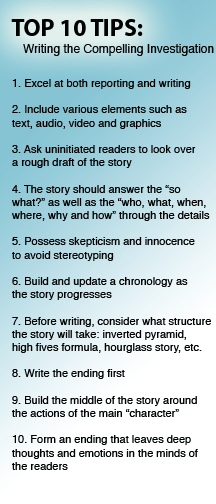
The Pulitzer Prize-winning series by The New York Times’ Clifford J. Levy is a prime example of a gripping presentation of an injustice that demonstrates the impact of that issue through exceptional storytelling.
In 2002 Levy wrote a six-part series called “Broken Homes” that ultimately exposed the abuse of mentally ill patients living in various state-regulated homes.
Levy demonstrated his strengths in both reporting and writing- skills that good investigative reporters must learn to master and balance. His research and reporting is incredibly thorough, with a balance of statistics and personal accounts.
Levy’s writing is equally powerful. The details of the story certainly answer the “who, what, when, where, why, how and so what?” of the issue.
His writing also exemplifies certain tips listed in The Investigative Reporter’s Handbook including keeping the “outrage” in sight and putting people in the foreground of the story. His story constantly relates back to the issue of the abuse of mentally ill patients, and the personal anecdotes are key in keeping people in the foreground of the story. Levy is also careful to address a controversial issue by presenting the facts and refraining from lecturing the readers.
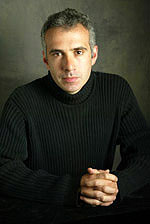
Levy won the 2003 Pulitzer Prize for his investigation involving the abuse of the mentally ill in adult homes. Photo from the Pulitzer Prize Web site
Levy’s investigative reporting remains consistently compelling from the opening lead through the ending without any lulls in the middle. The lead paragraphs demonstrate commanding writing that draws the reader into the story through the use of several anecdotes detailing various horror stories of abused patients.
The middle of the story contains just the right amount of flow and momentum needed to keep the reader’s interest. Levy introduces relevant numbers and statistics that are easy to understand. He also uses the “scene” technique by telling numerous stories of patients who have been abused. For instance, one paragraph details the horrifying story of a patient who eventually committed suicide, leaving a note that simply said “evil wins.”
The ending is just as compelling as the rest of the story, and leaves the reader with deep thoughts and emotions regarding the prevalence of abuse of the mentally ill. Levy concludes with the story of a patient, Mr. Maddix, whose home did not adequately address his needs. He was often left to suffer daily seizures alone because the staff didn’t bother to give him proper care.
When Maddix eventually died of a seizure alone in his bathroom, the home tried to cover up their neglect by saying he was unresponsive when they found him and soon after died, even though he had been dead for a full day before his body was even discovered.
The final sentence is extremely powerful, saying the “discovery of his body was almost routine” at the home. The shock value of the suggestions of the mistreatment of the mentally ill leaves the reader to ponder the issue and question the morals of these adult homes.